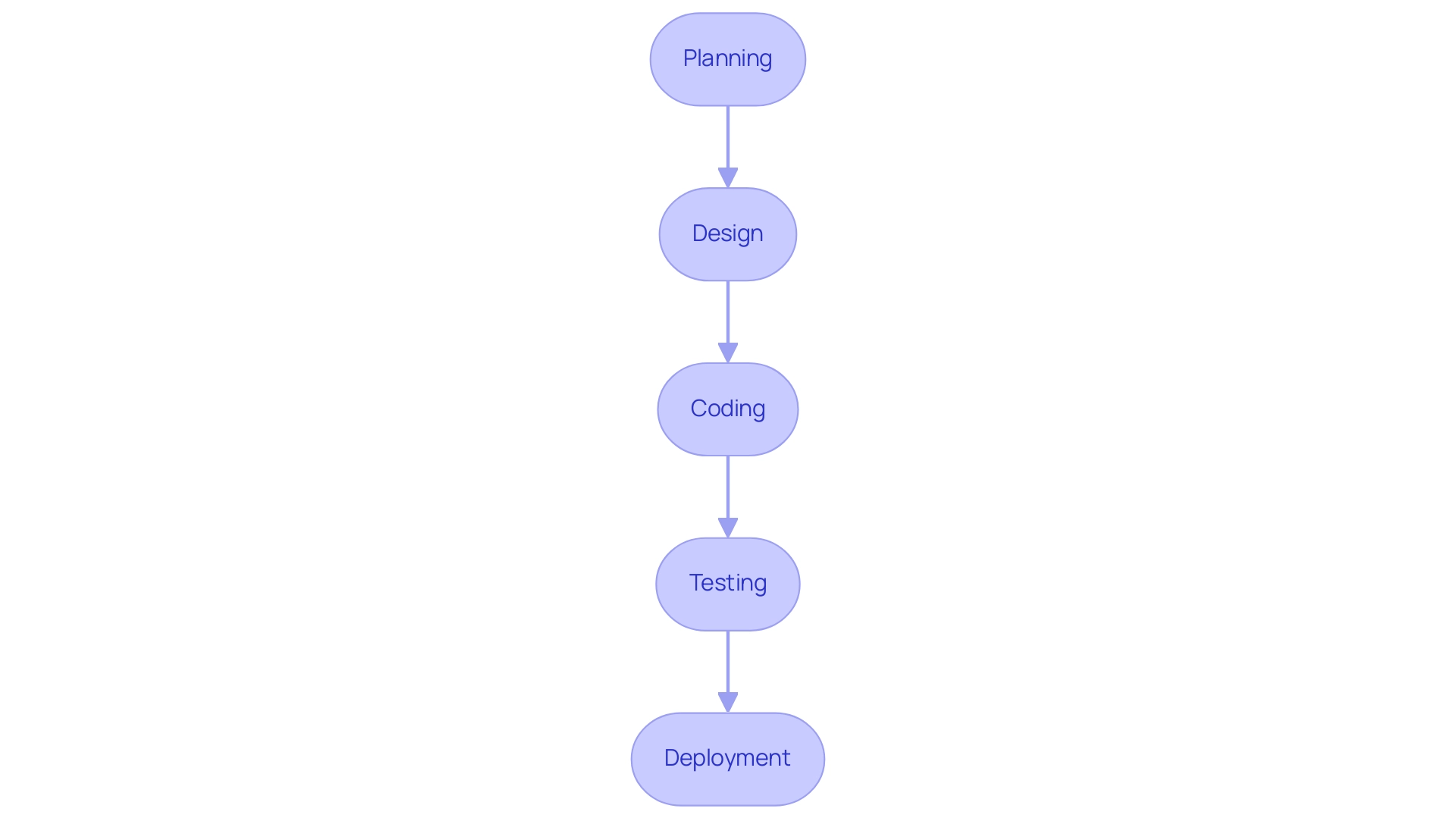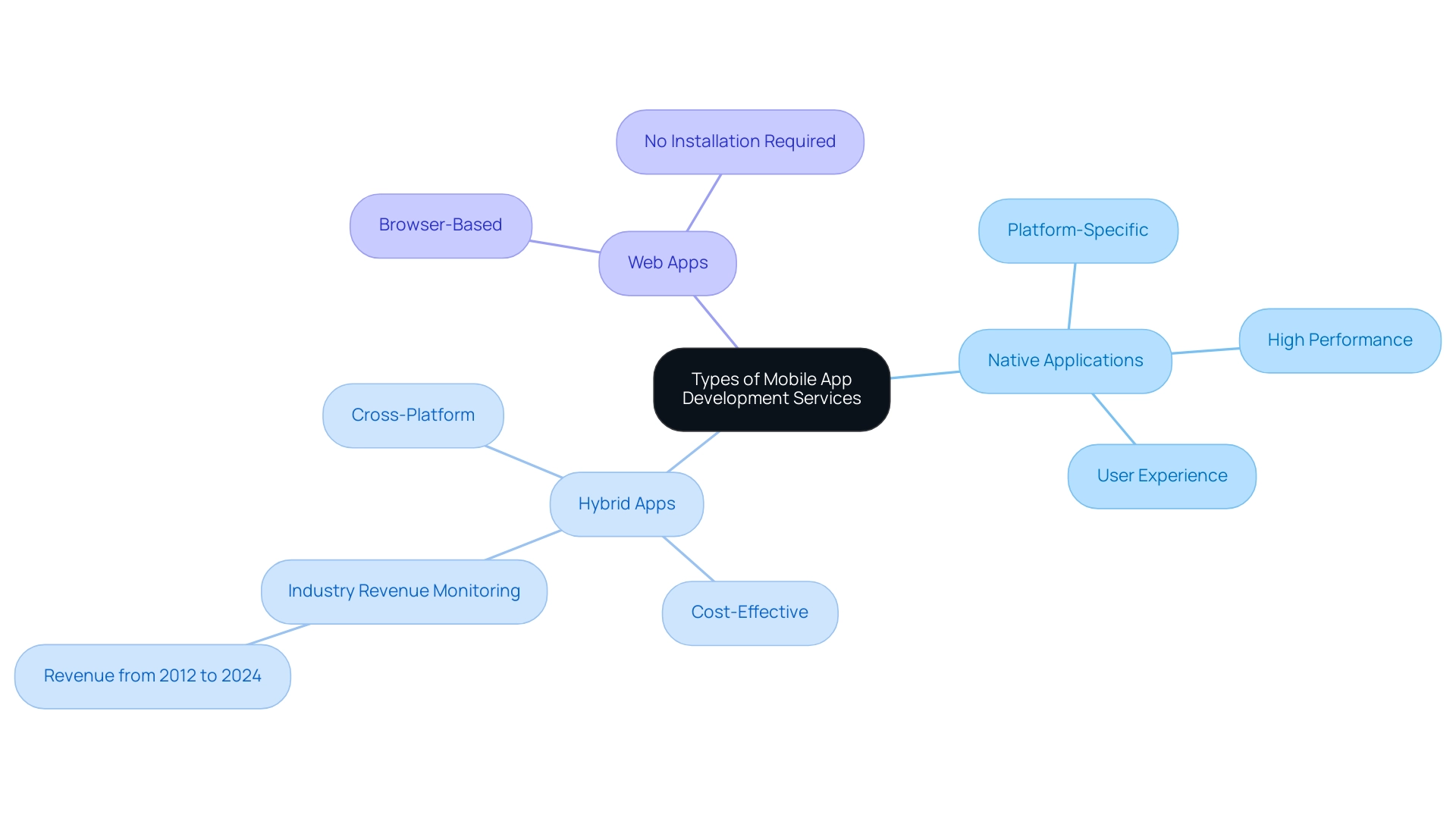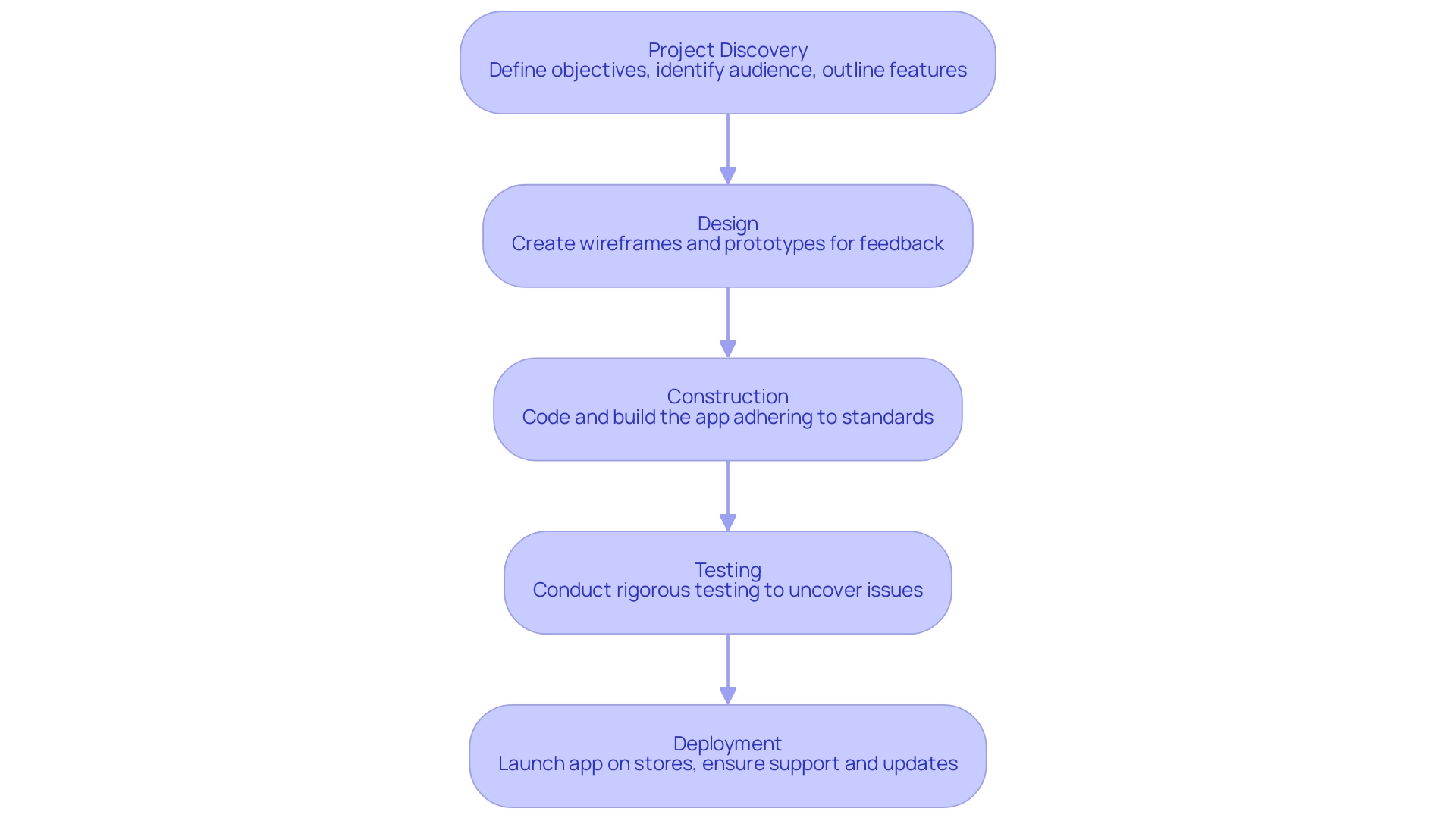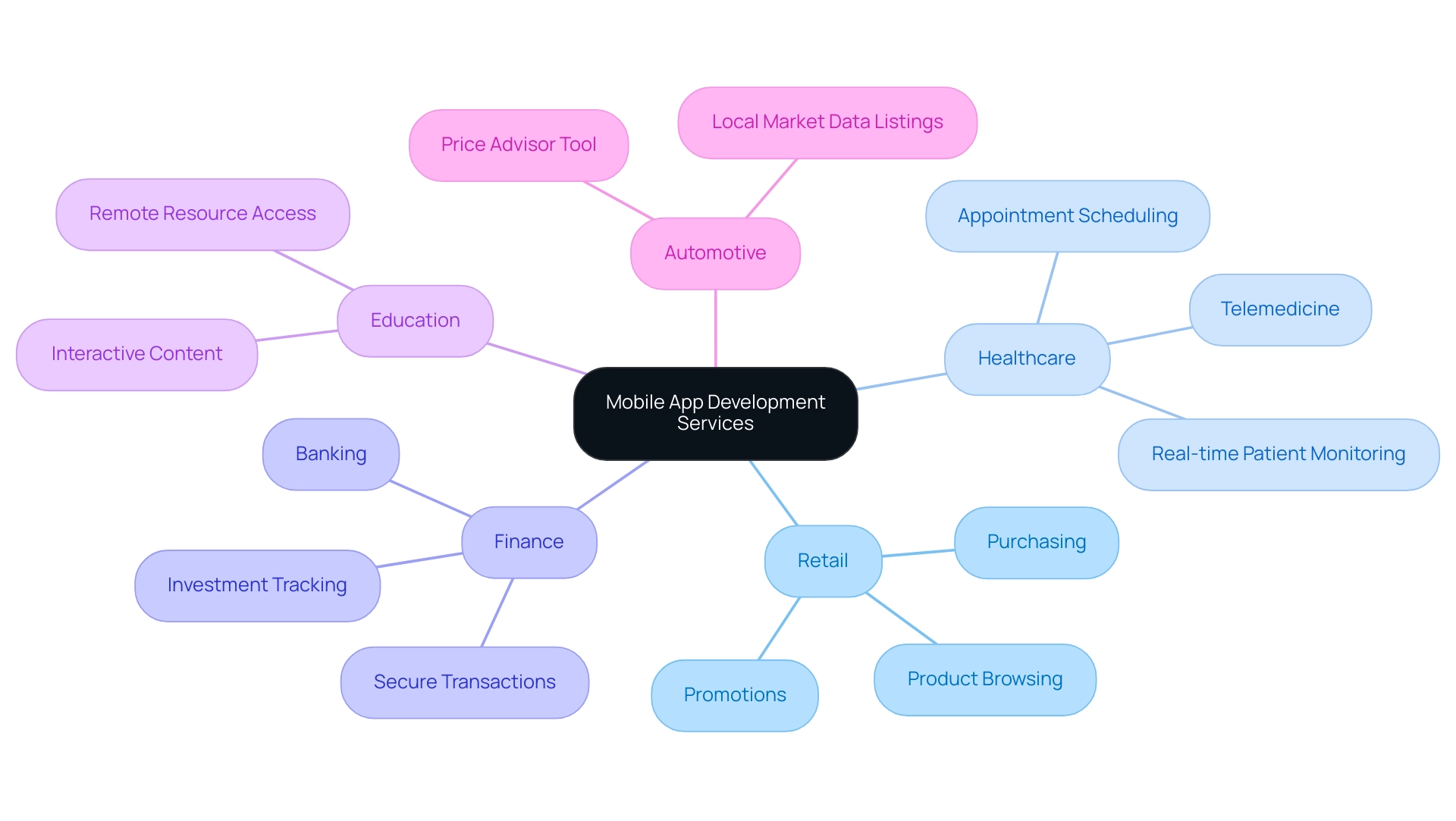Introduction
In the rapidly evolving digital landscape, mobile app development services have emerged as a cornerstone for businesses aiming to enhance their presence and engage effectively with consumers. As organizations recognize the necessity of a strong mobile strategy, the multifaceted process of creating applications tailored for smartphones and tablets becomes increasingly critical. This article delves into the intricacies of mobile app development, exploring the various types of services available, the comprehensive development process, and the diverse industries harnessing these tools to drive innovation and improve performance.
With compelling statistics and case studies highlighting the transformative power of mobile apps, this exploration underscores why investing in mobile technology is no longer optional but essential for sustained growth in today’s competitive market.
Understanding Mobile App Development Services
Mobile apps development services include the creation of software applications designed for portable devices, such as smartphones and tablets. This multifaceted process includes essential activities such as:
- Planning
- Design
- Coding
- Testing
- Deployment
As technology advances, the importance of a strong presence for businesses has become undeniable.
For example, Blue Cross and Blue Shield of Montana, which serves over 300,000 residents of Montana, illustrates how digital platforms can improve service delivery and foster innovation in the healthcare industry. Our tailored e-commerce solutions, backed by over 20 years of global experience, have a proven track record of significantly improving critical KPIs, enhancing retention rates, and increasing Average Order Value (AOV) for our clients. In 2024, mobile apps development services will be pivotal in driving customer engagement, as evidenced by statistics indicating that 88% of consumers are more likely to engage with a brand through an app than through its website.
Furthermore, applications not only improve user experience but also enable smooth transactions and provide valuable insights into consumer behavior. For instance, a recent case study demonstrated that a retail client experienced a 30% increase in retention rates and a 25% boost in AOV after implementing a custom application. Companies utilizing these tools can enhance customer retention rates and cultivate loyalty, making applications indispensable assets in the modern business landscape.
As expert opinions emphasize, the capacity to innovate through mobile apps development services is not merely a competitive edge; it is a crucial strategy for growth in today's digital economy. Furthermore, market insights from Schwab experts highlight the financial implications and opportunities within the mobile apps development services sector, underscoring the necessity for businesses to adapt and invest in these technologies. By focusing on community value and incremental revenue generation, our solutions empower businesses to thrive in an increasingly competitive environment.

Types of Mobile App Development Services
Mobile apps development services can be categorized into three primary types: native, hybrid, and web app development.
-
Native applications are crafted specifically for a single platform—either iOS or Android—utilizing platform-specific programming languages. This focus on a singular environment ensures the highest level of performance and user experience.
-
Hybrid apps integrate features from both native and web applications, enabling cross-platform functionality. This approach not only streamlines the creation process but also reduces associated costs, making it an appealing option for many businesses. Significantly, the industry revenue of software publishers in Washington has been monitored from 2012 to 2024, reflecting the increasing demand for mobile apps development services in this region.
-
Web apps, while mobile-optimized, operate through a browser and offer an experience similar to that of native apps without the need for installation. Each category type presents distinct advantages and trade-offs, thus necessitating a thorough evaluation of business objectives and resources to determine the most suitable approach.
According to Oleksandr Gerasymov, Chief Technical Officer, 'JavaScript is the most popular programming language,' further influencing the choice of technology in app development. This highlights the importance of selecting the right tools for the job.
Additionally, React Native has been utilized to develop popular applications such as Facebook, Uber, and Airbnb, showcasing its ability to deliver high-performance applications. The success of these applications illustrates React Native's effectiveness in creating native-like user interfaces and performance.
As companies navigate the evolving landscape of applications, understanding these differences becomes crucial for making informed decisions.

The Mobile App Development Process Explained
The mobile apps development services involve a multifaceted journey that typically unfolds in several key stages:
- Project discovery
- Design
- Construction
- Testing
- Deployment
In the project discovery phase, stakeholders collaboratively define the app's objectives, identify the target audience, and outline essential features that will drive user engagement. This foundational step is critical, especially considering that 24% more sales professionals meet their annual quotas when they have portable access to their CRM, underscoring the importance of application creation in driving sales performance.
The design phase follows, where wireframes and prototypes are crafted to visualize the user experience, allowing for early feedback and adjustments. During mobile apps development services, the actual coding and building of the app take place, emphasizing the importance of adhering to coding standards and best practices. Rigorous testing is critical at this stage, as it uncovers and addresses any issues before the app reaches users.
The latest best practices in mobile apps development services, particularly in application testing and deployment, ensure that the app performs optimally in various environments, enhancing user satisfaction.
Finally, deployment involves launching the app on various app stores while ensuring ongoing support and updates through mobile apps development services post-launch. Referrals play a significant role in the success of applications, as the lifetime value of referred customers is on average 16% higher than that of non-referred customers, highlighting the significance of user engagement and referrals. Grasping this extensive process not only assists companies in managing expectations but also prepares them to maneuver the intricacies of application creation effectively.
For instance, implementing a formal referral program can lead to substantial revenue growth, as seen in the case study on sales referral statistics, where referred customers tend to have a higher lifetime value.

Industries Leveraging Mobile App Development Services
Mobile apps development services are increasingly essential across a multitude of sectors, including:
- Retail
- Healthcare
- Finance
- Education
- Automotive industry
Companies such as Kelley Blue Book, a reputable name in the auto industry since 1926, illustrate how customized applications can improve key performance indicators (KPIs) and change the car buying experience. Their Price Advisor tool, which offers guidance on Fair Purchase Prices based on local market data, is a prime example of how app development can enhance consumer decision-making.
According to Kelley Blue Book, aiming for the Fair Purchase Price is crucial for buyers to ensure they are getting a good deal. In the retail space, applications are similarly revolutionizing shopping experiences by allowing customers to seamlessly browse products, make purchases, and receive tailored promotions that deepen engagement and boost Average Order Value (AOV). Recent statistics indicate that smartphone applications significantly contribute to retail sales growth, with businesses reporting improved customer retention and conversion rates.
In healthcare, the adoption of applications has revolutionized patient care by facilitating:
- Telemedicine
- Appointment scheduling
- Real-time patient monitoring
This ensures timely interventions and increases Lifetime Value (LTV). The finance sector has adopted technology for:
- Banking
- Investment tracking
- Secure transactions
This responds to consumer demands for convenience and security. Educational institutions utilize smartphone applications to enhance learning experiences through interactive content and remote resource access.
Lastly, the entertainment sector delivers content through apps that provide:
- Streaming
- Gaming
- Social networking functions
This diverse utilization of mobile apps development services highlights their crucial role in driving innovation and operational efficiency across industries, backed by over 20 years of global expertise in delivering tailored solutions that resonate with community needs and generate incremental revenue for organizations.

Conclusion
Mobile app development services are essential in today’s digital landscape, enabling businesses to enhance consumer engagement and operational efficiency. The comprehensive process of creating mobile applications—including planning, design, coding, testing, and deployment—establishes a strong mobile presence. With consumers increasingly favoring mobile apps over traditional websites, the future of customer interaction is clearly mobile-centric.
Different types of mobile app development—native, hybrid, and web apps—each offer unique advantages tailored to specific business goals. Understanding these distinctions is crucial as organizations navigate their mobile strategies. A thorough development process ensures high-quality user experiences and emphasizes the importance of ongoing support after launch.
Industries such as retail, healthcare, finance, and education are leveraging mobile app development to drive innovation and improve key performance indicators. Companies are using mobile technology to enhance customer experiences and streamline operations, demonstrating the transformative impact of these applications.
Investing in mobile app development is a necessary strategy for sustained growth in a competitive market. By prioritizing mobile solutions, businesses can foster deeper connections with consumers and unlock new opportunities for success. In an ever-evolving digital landscape, a well-executed mobile strategy is indispensable for organizations aiming to thrive.





